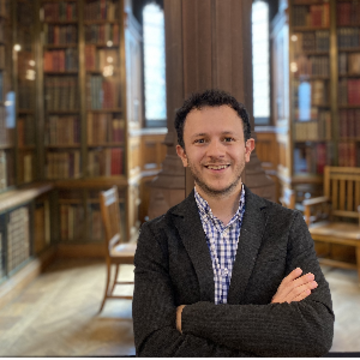Diego Rojas Arancibia, co-founder and CEO of PasanaQ

Diego is co-founder and CEO of PasanaQ. Diego is a MPP/MBA candidate at the University of Oxford and a Pershing Square Scholar. Diego is Bolivian and lived in Bolivia, USA, and Italy before arriving at Oxford. He is also co-founder and CEO of Tu Beca Bolivia, the largest NGO focused on education and entrepreneurship in Bolivia. PasanaQ is a fintech focused on digitizing informal savings associations (ROSCA) in LATAM and is currently operating in Bolivia and Peru. PasanaQ has a team of 10 people and just finished raising its preSeed round.
I am a mechatronics engineer with a MS in energy systems and a Fulbright alumni. While I was studying my MS in the USA I could work for an early stage energy storage company. My boss used to take me to his meetings and explain me the secrets of building an startup, that was when the entrepreneurship seed was planted in me. After 3 years of working in Italy I knew I wanted to go back to Latin America and work on something with impact. For me PasanaQ is the perfect way of combining traditions with financial literacy and Oxford was the perfect place to learning everything I needed to make my idea grow and success.

For me an entrepreneur is someone who finds a way of solving an unmet problem or improves a current way of solving a problem. I do not believe that one needs special skills, background, or experience to be an entrepreneur. The only thing an entrepreneur needs is passion for the idea that he or she wants to develop.
We knew that people needed a way to manage their informal savings associations (ROSCA) groups when we started talking to people. For us it was key to see the problem not from our perspective but from our users’ perspectives. ROSCA is a cultural thing in LATAM, and people were using it as a way of saving money because they did not have access to formal savings and credit opportunities. After dozens of interview we understood that PasanaQ was perfect in the sense that it allows people to keep track of their ROSCA group, while improving their credit scores.
The first one is the skill of adapting to new and sometimes frightening situations. As an entrepreneur you are not only a CFO or CMO, but you have to learn about every aspect of your business.
The second one is resilience. It is a long way to the top and you will hear from many people that your idea is not good enough. I talked to 77 investors when I was raising my preSeed round: 70 of them told me that they were not interested and just 7 invested at the end.
Last is to be a story-teller. An entrepreneur has to be able to imprint the passion he has for his idea to others: investors, users, and partners.
To feel that I am directly impacting the lives of people in my region. I left my last job because I wanted to feel that my work has a direct impact on people and now when talking to my team and users, I know that PasanaQ is helping them have access to better opportunities in their lives.
Marcelo Claure is probably the most famous Bolivian abroad and a worldwide recognized entrepreneur and investor. Although he has lived abroad for decades he is always proud of his Bolivian roots and has many project in Bolivia and Latin America.
I would like to know what he thinks is needed in Latin America to boost entrepreneurship. His work through SoftBank was key on visualizing the region’s potential and I am curious to know what is on his mind for the next ten years regarding this sector. I would also be nice to have him as an investor for PasanaQ.
To close our preSeed round. After pitching to dozens of investors and getting many negative answers, to close the round was really important as it allowed us to focus on operating. Additionally, to celebrate it with my team was a unique experience.
What would you say have been some of your mistakes, failures or lessons learned as an entrepreneur?
I coded the app based on what I wanted to see in a ROSCA app. When we launched the app, I realized that my users did not necessarily want the same that I want from the platform so we had to redesign our app so it could be user oriented. If I could go back, I would engage users in the app development process early on.
I am a coder so I started coding the app with my cofounder for almost a year before we decided to get two late cofounder onboard in order to develop our MVP faster. During all this time we were working on our free time on the platform and our expenses were minimum. Last year we got an angel investor onboard and with the money he invested we could work on marketing, legal incorporation, and soft-launching the app. By the end of last year we decided that in order to grow exponentially we needed to raise more money and opened our preseed round in LATAM and the UK.
Some contests such as the Entrepreneurship World Cup and OSEF at Oxford were key on helping us improve our pitch, meet investors, and showcase our ideas and objectives.
There is always something interesting happening in Oxford and chances to meet people that can help you, invest on you, guide you, or work for you are infinite. I met one of my investors in a random talk at Oxford that I signed up just the day before the event. The bad thing about being an entrepreneur in Oxfordshire is that the UK ecosystem in general is not yet that open to investing in startups based in LATAM.
The Entrepreneurship OBN at Said is an amazing resource for events and for meeting people with interest in entrepreneurship. Enterprising Oxford is pretty good at connecting people with mentors, events, and resources.
It is really difficult to row alone therefore your cofounder team is as important or more important than the idea you are pursuing.
Share this
More news



